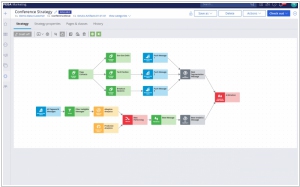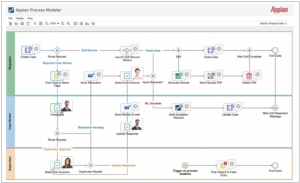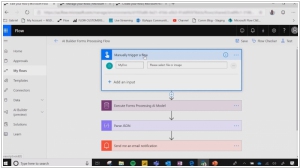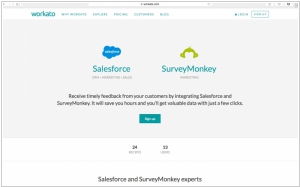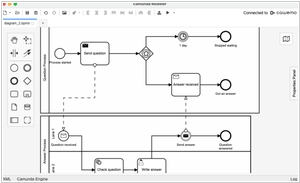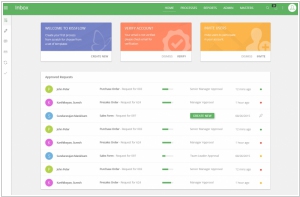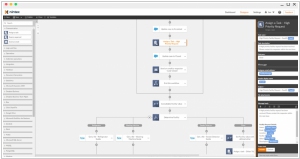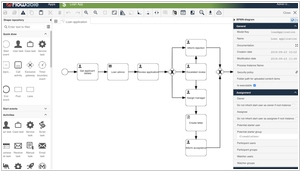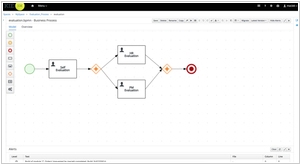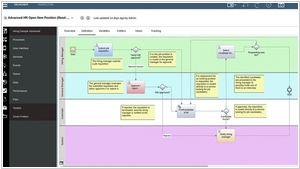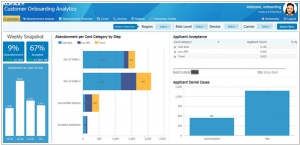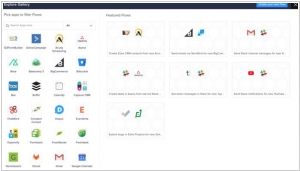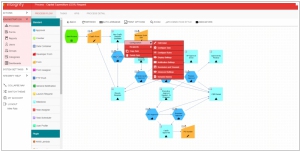Top 10 BPM and Workflow Automation software
February 03, 2024 | Editor: Michael Stromann
30
BPM (Business Process Management) and Workflow Automation software streamline and optimize business processes by automating repetitive tasks, improving efficiency, and ensuring consistent workflow management. These software solutions typically offer features such as process modeling, task automation, notifications, approvals, and performance analytics, empowering organizations to enhance productivity, reduce errors, and gain better control over their operations.
1
Award-winning case management, Robotic process automation and BPM for continuous operational excellence
2
Appian is a leader in low-code development & BPM. It provides companies a simpler way to create powerful software.
3
Microsoft Power Automate (earlier Microsoft Flow) - is a versatile automation platform that integrates seamlessly with hundreds of apps and services.
4
A single platform that automates work and powers innovation across your business.
Better Integrations Through Intelligent Automation
5
Camunda's process orchestration platform allows developers to design, automate and improve processes.
6
One platform to optimize, manage, and track all of your work: process management, case management, project management
7
Nintex is the market leader in end-to-end process management and workflow automation. Easily manage, automate, and optimize your processes with no code.
8
Creatio (formerly bpmonline) is a single platform to accelerate sales, marketing, service. It's a process-driven cloud based software that connects the dots between marketing, sales and customer service, allowing to efficiently manage the complete customer journey – from lead to order, and to ongoing account maintenance.
9
Flowable offers a full-scale and extensible platform for the automation of business processes that combines the power of standards-based Case, Process, and Decision models to increase efficiency and productivity.
10
jBPM is an open-source workflow engine written in Java that can execute business processes described in BPMN 2.0. jBPM is a toolkit for building business applications to help automate business processes and decisions.
11
IBM BPM is a comprehensive Business Process Management Platform (BPM), providing full visibility and insight to managing business processes.
12
Kofax Intelligent Automation software platform helps organizations transform information-intensive business processes, reduce manual work and errors, minimize costs, and improve customer engagement. We combine RPA, cognitive capture, process orchestration, mobility and engagement, and analytics to ease implementations and deliver dramatic results that mitigate compliance risk and increase competitiveness, growth and profitability.
13
Automate business workflows by connecting your apps with Zoho Flow. Build smart integrations to break the information silos in your business.
14
OMNITRACKER is a powerful tool to adapt processes to your needs. Our highly efficient, scalable and effective solution for IT service management (ITSM). It is based on the current ITIL standard and integrates other supporting processes.
15
Workflow Software That Makes Everyone More Productive. Build unlimited automated business workflows with no code required
Latest news about BPM and Workflow Automation software
2023. AI-based Workflow automation startup Parabola raises $24M
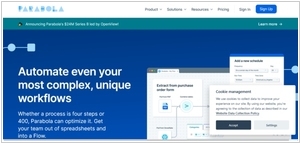
Parabola, a startup that utilizes artificial intelligence to streamline administrative tasks, especially in the logistics and e-commerce industries, has recently announced securing $24 million in a Series B funding round. With the Parabola platform, users can expedite the processing of various types of documents, including PDFs, text message logs, images, and emails. Parabola offers functionalities such as standardizing, enriching, and categorizing these documents. For instance, given a list of product names, Parabola can categorize them based on specific departments like "clothing," "home goods," "grocery," and "electronics." It can also ensure consistency in invoice formats and extract relevant information such as the amount, due date, sender details, and line items, organizing them into a table. Additionally, the platform can analyze Amazon keyword rankings within a specified timeframe, allowing e-commerce teams to optimize their product listings.
2022. Bardeen raises $15.3M for browser-based workflow automation
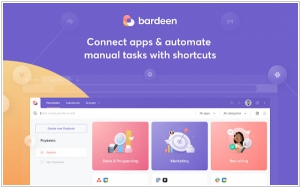
Bardeen, a startup specializing in workflow automation, has successfully raised $15.3 million in funding. The company addresses specific challenges in the realm of automation, with a primary focus on enhancing user experience and facilitating the discovery of automation solutions. Bardeen holds a significant advantage by operating directly within the user's browser, leveraging edge computing for data processing and storage. This approach ensures that all operations take place locally, within the user's browser environment. Additionally, Bardeen incorporates AI modules for tasks such as text-to-speech, optical character recognition, and Smart Suggestions. Smart Suggestions is a distinctive feature that recommends relevant automations to users based on their current context. The company aims to continually improve Smart Suggestions, enabling it to learn and suggest any automation that can effectively save time for the user.
2021. Ikigai gets $13M to build automated workflows with humans in the loop
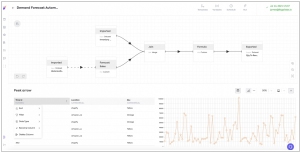
A startup called Ikigai has recently secured $13 million in a seed round of funding. Ikigai aims to simplify the process of building workflows that involve human decision-making, in contrast to traditional robotic process automation (RPA) which focuses on creating bots for repetitive tasks. With Ikigai's platform, users can easily construct workflows by leveraging a drag-and-drop interface that integrates various data sources. The tool allows for the inclusion of decision points where humans play a role in the process. The outcomes and results can be visualized and analyzed through a dashboard or spreadsheet view, creating what the company refers to as an "AI-charged" spreadsheet.
2021. Tonkean raises $50M to accelerate its no-code business automation service
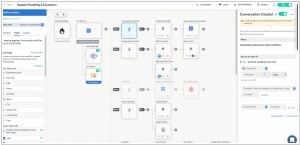
Business operation automation startup Tonkean has successfully raised $50 million in Series B funding. Tonkean stands out as a unique combination of business process automation, no-code technology, and human involvement. In essence, the company offers a platform that enables operational teams within organizations, such as sales ops and marketing ops, to establish automated business logic across various applications, incorporating elements that involve human input. Tonkean has developed its system to be IT-friendly, making it capable of supporting large-scale enterprise customers. By utilizing no-code tools, the Tonkean software allows operational teams to leverage pre-built command modules or create custom ones to construct their own business logic as required. Adopting this software empowers teams within companies, reducing their reliance on engineering groups and enabling them to accelerate and automate their work independently.
2021. n8n raises $12M for its ‘fair code’ approach to low-code workflow automation
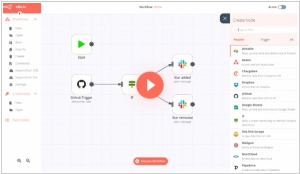
In a Series A funding round, Berlin-based n8n has successfully raised $12 million. n8n offers a comprehensive framework that enables both technical and non-technical individuals to synchronize and integrate data and workflows. Currently, n8n supports the seamless connection and integration of data and functions across more than 200 established applications, as well as any custom apps or services utilized within specific organizations. The aim of n8n is to provide technical superpowers to everyone, empowering teams like marketing or IT to accomplish tasks beyond their traditional capabilities. This includes developing advanced chatbots, creating innovative data visualizations in platforms like Slack, and implementing automation features within products, such as performance monitoring and maintenance alerts.
2021. Zoho launches new low code workflow automation product
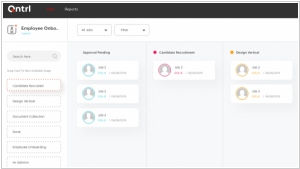
Zoho, a renowned provider of cost-effective business tools, has unveiled a new offering in the form of a low code workflow product named Qntrl (pronounced as "control"). Designed specifically for the mid-market segment, Zoho's Qntrl offers a user-friendly approach to business process management, requiring less technical expertise compared to traditional tools in the market. While connecting workflows to more complex backend systems such as CRM or ERP may necessitate some technical assistance, Qntrl empowers non-technical end users to effortlessly drag and drop components, allowing them to create workflows independently and seek assistance as needed to complete the process effectively. With Qntrl, Zoho continues to cater to the evolving needs of businesses, enabling streamlined workflow management with greater accessibility and ease.
2021. Process automation startup Camunda raises $98M

Camunda, a startup based in Berlin, has announced an impressive €82 million Series B funding round. The company specializes in developing open-source process automation software. Camunda has established itself as a versatile orchestration layer that is compatible with various endpoints. This includes the coordination of end-to-end automation or orchestration, encompassing endpoints such as RPA bots, microservices, and manual tasks. Camunda empowers organizations to seamlessly orchestrate the collaboration of different automation components, enabling the creation of comprehensive workflows across the entire company. In addition to its open-source platform, Camunda also offers the Camunda Cloud, a cloud-based service for enhanced convenience.
2021. IBM Business Process Manager is renamed to Business Automation Workflow
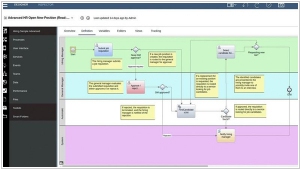
IBM Business Process Manager (BPM) and IBM Case Manager have undergone a consolidation process, resulting in the creation of a unified product known as IBM Business Automation Workflow. This new offering not only combines the functionalities of both BPM and Case Manager but also introduces additional features. Users can now organize library items in custom smart folders, enhancing organization and accessibility. Improved validation in the web-based IBM Process Designer enables better identification of issues in scripts. The Process Admin Console allows for monitoring system maintenance data, providing valuable insights. Furthermore, users can import environment variables and servers from other process applications or toolkits, ensuring seamless integration. Performance Monitoring facilitates the detection of resource-related problems. In Process Designer, modeling gateway decisions can now be accomplished using decision tables or action rules. Additionally, users can enjoy a streamlined experience through the implementation of a single sign-on feature.
2021. SAP is buying Berlin business process automation startup Signavio
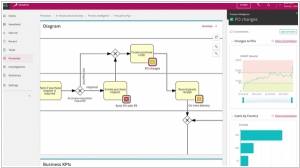
SAP has recently completed its acquisition of Signavio, a business process automation startup, for approximately $1.2 billion. This move reflects SAP's recognition of the value in adopting a more modern and cloud-native approach to address the challenges of enterprise business process automation. The ability to automate business processes through the cloud has gained significant importance, especially during the pandemic when remote work has become prevalent. By incorporating Signavio's cloud-native tool into its portfolio, SAP aims to enhance its capabilities in automating and optimizing business processes. SAP also views Signavio as a valuable addition to its business process intelligence unit, filling a crucial gap in its offerings.
2020. Microsoft brings new process mining features to Power Automate
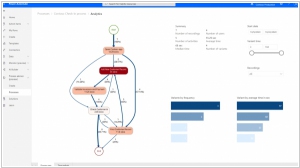
Power Automate, the workflow optimization platform by Microsoft, introduces a new tool called Process Advisor. This innovative process mining tool offers a collaborative environment for developers and business users to collaboratively create new automations. The concept behind Process Advisor recognizes that business users possess intricate knowledge of specific processes. With the new tool, business users can now record their execution of processes, such as refund procedures, and share them with developers who may not be well-versed in these processes. This facilitates effective collaboration and allows developers to gain valuable insights into the intricacies of various business operations.
2020. Fylamynt raises $6.5M for its cloud workflow automation platform
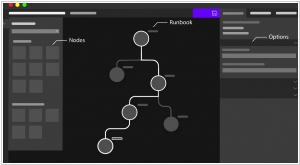
Fylamynt, an innovative platform that simplifies cloud workflows, has officially launched, accompanied by the announcement of a successful $6.5 million seed funding round. While the idea of automating workflows may be familiar, Fylamynt brings a fresh approach to this competitive field. The platform enables developers to seamlessly integrate their diverse cloud tools, allowing them to create efficient and repeatable workflows. Unlike services like IFTTT or Zapier, which focus on general integrations, Fylamynt specifically targets infrastructure workflows. While Ansible and Terraform already automate various aspects of infrastructure management, Fylamynt sets itself apart by providing an integrated layer that enhances and complements these existing solutions. By leveraging and expanding upon these technologies, Fylamynt offers an advanced and comprehensive solution for optimizing cloud-based workflows.
2020. Salesforce applies AI to workflow with Einstein Automate
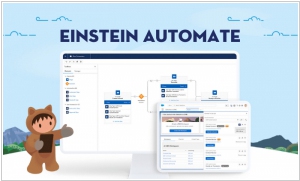
Salesforce has unveiled Einstein Automate, a new collection of workflow solutions powered by artificial intelligence (AI). Einstein serves as Salesforce's AI platform, encompassing all aspects of the company's product portfolio. It introduces automation to various tasks and simplifies the process of extracting valuable customer information, which often gets buried within vast amounts of data. Furthermore, Salesforce is incorporating MuleSoft, an integration company it acquired for $6.5 billion in 2018, into its offerings. This integration enables IT professionals to effortlessly build intricate connections between applications across the enterprise and the Salesforce suite of products, enhancing processes like mortgage approval workflows and more.
2020. Nintex to acquire process automation competitor K2 Software
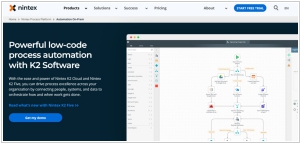
Workflow automation company Nintex has announced its acquisition of K2 Software, a provider of process automation software. K2 Software, established in 2000, boasts a customer base consisting of 30% of the Fortune 100 companies and serves 1.5 million users across 84 countries. Following the completion of the acquisition, Nintex anticipates having over 10,000 customers and generating revenue exceeding $200 million. The collaboration between Nintex and K2 will bring forth a wider range of process management and automation solutions, benefiting their respective customers and partners. By combining their development teams, both companies aim to accelerate innovation in this rapidly expanding market. The specific terms of the deal were not disclosed.
2020. Microsoft brings new robotic process automation features to its Power Platform
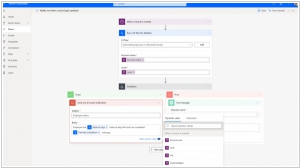
Earlier this year, Microsoft made the acquisition of Softomotive, a key player in the low-code robotic process automation field, primarily focusing on Windows. Building upon this, the company has now introduced Power Automate Desktop, a novel application leveraging Softomotive's technology, enabling users to automate desktop workflows without requiring programming skills. Power Automate already facilitated the connection of web-based applications, akin to platforms like Zapier and IFTTT. However, Microsoft further expanded its capabilities by introducing a browser extension last year, facilitating the integration of native system components with Power Automate. With the inclusion of Softomotive's technology and the launch of this new low-code Windows application, Microsoft is taking integration to the next level by seamlessly incorporating it within the native Windows user interface.
2020. Parabola no-code platform raises $8M as it focuses on eCommerce
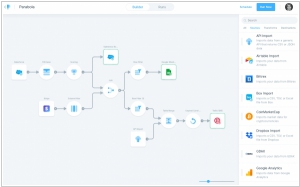
Many professionals today find themselves burdened with numerous manual tasks, such as tediously copying and pasting data into spreadsheets or sending repetitive emails daily. The lack of coding skills often hinders their ability to automate these processes. Parabola aims to address this challenge through a user-friendly drag-and-drop workflow setup. In an exciting development, the startup has recently secured an $8 million Series A investment. Additionally, Parabola has introduced a new Shopify connector, recognizing the surge in online shopping due to the impact of COVID-19. The demand for Parabola's workflow automation services from e-commerce vendors has grown in tandem, leading to the expansion of functionalities to cater to this specific domain.
2020. AI for business processes provider FortressIQ snags $30M
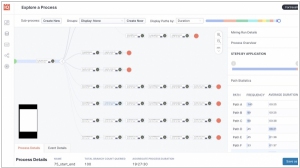
FortressIQ, a startup dedicated to assisting companies in utilizing data to gain insights and enhance internal processes, has recently disclosed a $30 million Series B investment. Initially focused on employing computer vision to comprehend workflows, customers are now harnessing the power of this data to drive their own internal transformations. In the past, achieving such transformations necessitated the involvement of expensive consulting teams, but FortressIQ endeavors to leverage software, data, and artificial intelligence to eliminate the need for consultants and uncover areas for process improvement.
2019. Bpm’online rebrands as Creatio

Low-code business process automation and CRM company Bpm'online has made an exciting announcement - it is undergoing a rebranding and will now be known as Creatio. This new name embodies the company's firm belief that individuals will possess the ability to become developers, empowering them to automate concepts and craft tailored solutions within a matter of minutes. Creatio has earned considerable recognition as a market leader, acknowledged by prominent industry analysts. Its intelligent platform enables the swift acceleration of sales, marketing, service, and operational processes for a vast customer base and numerous global partners.
2016. IBM and Box unveiled easy-to-use BPM tool
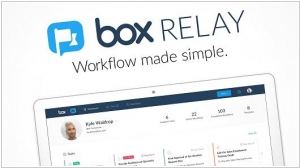
Box and IBM have collaborated to introduce Box Relay, an additional feature for Box's primary cloud storage service. This innovative add-on enables teams within a company to create personalized workflows and extend invitations to external partners. Through a user-friendly dashboard, individuals can perform various actions such as reviewing, editing, uploading, approving, or rejecting documents. The process is facilitated by alerts, notifications, and email reminders that keep everyone informed of the workflow's progress. Users can conveniently share links with others for review and monitor the project's advancement in real time. This collaborative platform ensures transparency by highlighting any potential delays or bottlenecks encountered during the project.
2016. Microsoft Flow is available on iOS
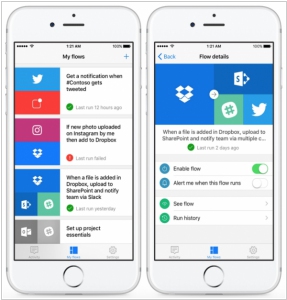
Microsoft Flow, the workflow management tool, has made its debut on iOS. This powerful tool enables users to combine two or more cloud services to create customized workflows, automating tasks such as file synchronization, alerting, and data organization. While other competing services like IFTTT and Zapier have been available for a longer time and offer a wider range of supported connections, Microsoft Flow differentiates itself by focusing on integrations with Microsoft's own business tools, including Office 365, Dynamics CRM, PowerApps, and Yammer, as well as popular organizational tools like MailChimp, GitHub, Salesforce, and Slack. Despite its emphasis on Microsoft's tools, Microsoft Flow can still be used to automate various common scenarios. For example, you can receive a text message whenever your boss sends you an email, save the results of a Twitter search to an Excel file, copy files from OneDrive to SharePoint, or transfer photos from Instagram to Dropbox, among many other possibilities. With the newly introduced iOS application, users now have the convenience of managing their previously created "flows" directly from their smartphones. This means you can easily toggle them on or off, access their properties, and review run history reports to ensure optimal performance and error-free execution.
2015. Bpm’online announced key executive appointment and new US headquarter

Cloud CRM software vendor bpm’online has welcomed Michael Rooney as the new Senior Vice President and General Manager of bpm’online in North America, according to an announcement made by the company. This appointment also signifies the inauguration of bpm’online's fresh office in Boston, MA, which will function as the company's headquarters in the United States. The primary objective of establishing this office is to expedite sales operations and foster collaborations with technology and market professionals. By doing so, bpm’online aims to attract the finest engineering and sales experts in the Boston area, while facilitating the expansion of its customer and partner network.
2010. Alfresco launched free BPM engine

Alfresco loves to make problems for IT giants by its altruistic approach to business. For several years, this company is exerting pressure on ECM market leaders (Microsoft, IBM, Open Text, EMC, Oracle) by providing high-quality free/cheap open-source system Alfresco ECM. And now, the company decided to build communism in another, related IT field - BPM (Business Process Management). The new Alfresco product - Activiti is absolutely free, open-source BPM system, distributed under Apache License 2.0. To develop this system Alfresco (traditionally) enticed executives from competing project JBoss jBPM - Tom Baeyens and Joram Barrez. They were helped by the SpringSource (VMWare) developers. In result they built light-weight, fast and free product that is intended to revolutionize the BPM market. ***
2010. IBM launched social BPM service
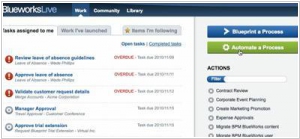
BPM (business process management) - is hardly associated with social services, which are intended for free interaction, rather than for formal automation. Nevertheless BPM systems are also becoming social. Few days ago IBM launched the SaaS service Blueworks Live that really has a human (social) face. Looking at the service you are thinking - "OK, everything is simple and clear. you draw a sequence of tasks (like in Visio). start a process. tasks are automatically created according to the algorithm. each user has own task list (like in Outlook). task notifications are sent by email. user follows the link, adds comments or clicks "Check" button. all actions are logged in activity stream (like in Facebook). so why do they call all this with the complicated word BPM? ". ***

